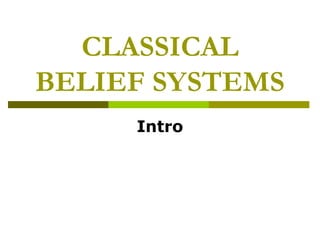Classical Belief Systems
•Transferir como PPT, PDF•
2 gostaram•4,250 visualizações
This document provides an overview of major belief systems from the classical period, including Hinduism, Judaism, Zoroastrianism, Buddhism, Greek Rationalism, Legalism, Confucianism, Daoism, and Christianity. It discusses their origins and founders, core beliefs like views on the afterlife and challenges to social structures, and how they spread geographically along trade routes and through conquest and migration. Key texts associated with these religions are also mentioned.
Denunciar
Compartilhar
Denunciar
Compartilhar

Recomendados
Recomendados
Framing Conversations about Race and Racial Equity

Framing Conversations about Race and Racial EquityKirwan Institute for the Study of Race and Ethnicity
Mais conteúdo relacionado
Mais procurados
Framing Conversations about Race and Racial Equity

Framing Conversations about Race and Racial EquityKirwan Institute for the Study of Race and Ethnicity
Mais procurados (20)
Lecture 2 defining stereotypes, prejudice & discrimination

Lecture 2 defining stereotypes, prejudice & discrimination
Framing Conversations about Race and Racial Equity

Framing Conversations about Race and Racial Equity
Destaque
Destaque (12)
Semelhante a Classical Belief Systems
Semelhante a Classical Belief Systems (20)
Interconnectedness of religion , geography, culture and history.pptx

Interconnectedness of religion , geography, culture and history.pptx
Mais de Nathan Roher
Mais de Nathan Roher (20)
Último
Último (20)
Post Exam Fun(da) Intra UEM General Quiz - Finals.pdf

Post Exam Fun(da) Intra UEM General Quiz - Finals.pdf
Danh sách HSG Bộ môn cấp trường - Cấp THPT.pdf

Danh sách HSG Bộ môn cấp trường - Cấp THPT.pdf
The Ultimate Guide to Social Media Marketing in 2024.pdf

The Ultimate Guide to Social Media Marketing in 2024.pdf
Basic Civil Engineering notes on Transportation Engineering, Modes of Transpo...

Basic Civil Engineering notes on Transportation Engineering, Modes of Transpo...
Pragya Champions Chalice 2024 Prelims & Finals Q/A set, General Quiz

Pragya Champions Chalice 2024 Prelims & Finals Q/A set, General Quiz
Classical Belief Systems
- 1. CLASSICAL BELIEF SYSTEMS Intro
- 2. Hinduism, Judaism, Zoroastrianism, Buddhism, Greek Rationalism, Legalism, Confucianism, Daoism & Christianity Belief Systems of the Classical Period
- 3. Belief systems in CONTEXT Historians view belief systems in the context of time and place. For example: Buddhists in India in the 300s ce were not the same as Buddhists in Southeast Asia in the 1800s ce though some of the core beliefs remained unchanged. Historians view belief systems as an influence ON culture AND influenced BY culture. For example: Christianity changed Roman culture and the Renaissance in Europe influenced Christianity.
- 4. Hinduism Oldest Belief System
- 5. Judaism . . . Monotheism
- 7. Zoroastrianism Good vs Evil / Heaven
- 8. Politics, Social Structure, Fam
- 9. Gautama - the founder Spread to East Asia
- 10. Christianity Jesus of Nazareth – Founder Began as a Jewish sect & spread through the Roman World
- 11. Hinduism, Judaism, Zoroastrianism, Buddhism, Greek Rationalism, Legalism, Confucianism, Daoism & Christianity Belief Systems of the Classical Period
- 12. Foundations There is no recorded founder of Hinduism – it is the oldest institutional religion of the early belief systems. Judaism began in the Middle East around the 1200s bce when it had its own political empire. First monotheistic religion
- 13. Foundations Daoism emerged in East Asia in the 600s to 300s BCE from the teachings of Laozi Zoroastrianism arose in Persia in the 500s BCE from the teachings of Zarathustra
- 14. Foundations Siddhartha Gautama (the Buddha), the founder of Buddhism, was originally a Hindu in the upperclass. Buddhism emerged in South Asia out of Hinduism starting in the 500s bce.
- 15. Foundations Jesus of Nazareth, the founder of Christianity, was a lower-class Jew living in Roman controlled Middle East at the beginning of the common era. The Jesus movement became Christianity with non-Jewish converts.
- 16. Existence after Death Hinduism and Buddhism – Existence is cyclical until one breaks from the cycle and becomes eternally spirit. Zoroastrianism & Christianity – Existence is linear; one lives and then becomes eternally spirit.
- 17. Challenges to Society Both Buddhism & Christianity, more than the other belief systems, challenged the social class systems and women’s status. Especially in the early centuries, these religions appealed to lower classes and women.
- 18. Spread Groups within Buddhism and Christianity supported missionaries – men and women who purposely took the message of a religion into different regions. Religions also spread through conquest, along trade routes, and through migrations.
- 20. Spread Buddhism spread from South Asia into East and SE Asia. Buddhism by the 500s ce was stronger in areas where it spread than where it originated.
- 22. Spread Judaism spread after the Romans exiled Jews to new territories in Europe Christianity spread into the Roman Empire, into North and East Africa, and beyond. Christianity by the 1200s was stronger in areas where it had spread than in where it originated.
- 25. Spread & CHANGE As religions spread and new interpretations arose – there were changes, splits into different sects (or groups), and new influences In classical period – Buddhism split into Mahayana and Theravada
- 28. Texts The founders of Buddhism and Christianity did not record their own statements or life story. Which belief systems are connected to these texts? Vedas and Upanishads Torah Gospels & Epistles Analects Sutras / Dhammapada
- 29. Hinduism, Judaism, Zoroastrianism, Buddhism, Greek Rationalism, Legalism, Confucianism, Daoism & Christianity Belief Systems of the Classical Period
- 30. Greek Rationalism…What’s up with that??? In Greece, some intellectuals like SOCRATES, PLATO, and ARISTOTLE abandoned mythology and created a philosophy that emphasized. . . Natural laws govern the world & humans can understand those laws through reason Using reason to describe human behavior (first histories – Herodatus) questioning of earlier “wisdom” and assumptions ---had a major influence on Western Civilization
